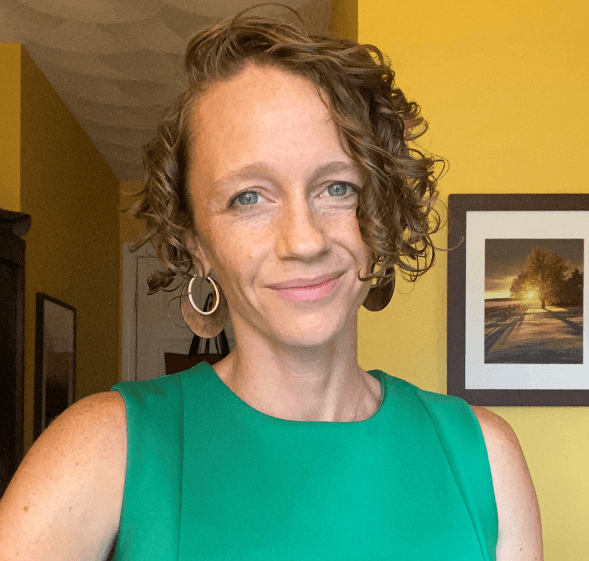Thursday Thoughts: with Kim Paull, MPH
Welcome back to “Thursday Thoughts,” our bi-weekly interview series where we interview experts in the fields of healthcare research and policy. This week, FHC Project Manager Lisa Tse sits down with Kim Paull, MPH, to discuss how COVID-19 has, and will continue to shape her work in Rhode Island.

Kim is the Director of Data and Analytics for the Rhode Island Executive Office of Health and Human Services (EOHHS). She leads the state’s Data Ecosystem, a unique and powerful integrated data system (IDS) that provides valuable insights into the clinical, social, and economic needs of Rhode Islanders and an unparalleled understanding of their health and wellbeing. Kim’s professional interests lie in compelling, community-driven studies that inspire action and shaping data for easy self-service analytics.
Lisa Tse: What’s surprised you the most in the past 3 months?
Kim Paull: A few things –
- How interconnected we all are and how a few particles can take down an entire economy. I’ve always been fascinated with true systems and systems thinking – this is why I got into integrated data systems in the first place. People aren’t just slices of data; there’s magic when you see all aspects of a person’s life together. COVID has laid bare how fragile all of these connections are.
- I think the pandemic has led to some big changes that aren’t going away any time soon. For example, we’ve figured out a lot in terms of helping people to work from home from a technology stand-point.
- COVID has also shined a light on some big, ongoing vulnerabilities in our system, like racial inequities and insufficient supports for working parents. These are things we really need to figure out and find long-term solutions for.
- I’ve been stunned by how resilient the state safety net and our people have been. We’ve been doing what we need to do to get things done. For example, folks at the state have been hand-delivering personal protective equipment (PPE) and buying up hotel rooms to provide shelter when it’s needed, etc.
LT: What’s been the most helpful data that’s guided your work in the past 3 months?
KP: COVID-19 testing and case investigation data have been the cornerstone of our work lately. This data has helped us to figure out how many are infected, where folks are getting infected, who needs care, and who is vulnerable. We haven’t been able to figure out all of the exact vectors of disease – much of the data we have is correlative right now – but we are using what we have to triangulate ways to reopen our economy and the state in as safe a way as possible.
LT: What’s the most interesting statistic you’ve seen in the past 3 months?
KP: The effects that COVID has had in suppressing the use and utility of many state safety net services. For example, we’ve seen a drop in DCYF hotline calls and a rise in domestic violence reports since March. We have to figure out new ways of connecting people with necessary support.
LT: What have you learned about doing your work better and/or faster that should be preserved?
KP: Many members of our team were activated to assist with the state’s COVID response in March. The volume of work has been high and the pace fast. What I’ve learned from this is:
- A shared purpose that people can see and touch, a strong sense of trust among the team, and a mutual understanding of the intent and importance of each ask, all help to move important work forward quickly. These things are good accelerants that can exist in the absence of COVID.
- The importance of taking breaks – you pay the price if you don’t stop. We felt this when we were working 7 days a week, sometimes over 12 hours a day. Getting good work done fast over the long term means we, as people managers, need to establish a healthy culture and enforce breaks to help our team and ourselves avoid burnout.
- Additionally, I have learned that sometimes the minimal viable analytic product is OK. You need to get done, what you need to get done.
LT: What should we be measuring 6 months from now?
KP: K-12 (kindergarten to 12th grade) developmental metrics, child safety, and how families are doing. Right now, we’re one foot in and one foot out in terms of returning to school with hybrid learning and this is having different impacts on different folks. We should look beyond clinical data and call up school social workers to understand the universe of services that are needed to support kids and their families. We know that kids’ mental health is super dependent on parents’ mental health. This is a capital ‘T’ traumatic event. As resilient as we all are, these difficulties are going to manifest in some way, so we need to understand how this is impacting folks and make sure we are there to support them.
LT: You’re organizing a socially distanced dinner party in this time of COVID, which three people (dead or alive) would you invite?
KP: I would be really interested in talking to Patient 0 of the pandemic, his/her care team, as well as the researcher in Wuhan who discovered the virus. I want the origin story: who figured it out, how they figured it out, and what was it like when they figured it out. In the same vein, I’d love to chat with Anthony Fauci and New Zealand’s Prime Minister Jacinda Ardern about their approaches to the pandemic.
—
This piece is the latest in our Thursday Thoughts series. Are you interested in learning about survey data, information sharing, and archaeology? Check out our previous Thursday Thoughts interview with Brian Robertson, PhD, of Market Decisions Research here or email us at [email protected].
